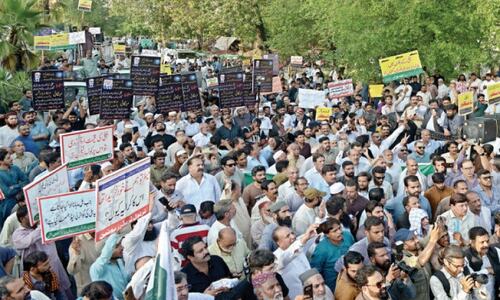Residents of Khyber Pakhtunkhwa’s Battagram took to the streets and blocked a stretch of the Karakoram Highway near the Khatm-i-Nabuwat Chowk on Saturday, decrying action against illegal connections (kundas) and electricity connections, as well as defaulters.
Last week, the interim government announced plans to launch a crackdown on electricity theft, which federal ministers said led to combined losses of hundreds of billions of rupees and higher bills for the common citizen. The announcement came as the government, facing the ire of agitated masses over inflated electricity bills in August, mulled its options — although limited — to placate the people who have been out on streets across the country.
There have been reports of widespread crackdowns on pilferers in several areas since.
As the action continued, residents in several areas of Battagram — mainly Ajmera and Chappargram — came out in the streets against the local administration officials today. They initially staged a demonstration in the main bazaar of Battagram and later moved to the Khatm-i-Nabuwat Chowk, blocking a part of the Karakoram Highway.
A Dawn.com correspondent covering the demonstration reported that the protesters shouted slogans, rejecting the “thuggery” of Battagram Deputy Commissioner (DC) Tanveerur Rehman and the Water and Power Development Authority (Wapda).
“DC ki ghunda gardi namanzoor, Wapda ki ghunda gardi namanzoor (we reject the thuggery of the DC and Wapda),” he quoted them as saying.
The protesters also called for the DC’s transfer — claiming that his incompetence was leading the district towards anarchy — and restoration of electricity to the area.
Addressing the gathering, Chappargram Village Council Chairman Shaukat Hayat decried that officials had disconnected electricity to the entire union council without keeping in view the “ground realities”.
“The electricity supply has been suspended to even those consumers who have been paying their bills regularly and have legal connections,” he said.
He denounced the Battagram DC for what he saw as an attempt to “impose his biased decisions on the poor while the influentials in the district remain untouched”.
The DC should be replaced by a “wiser person capable of running the affairs of the district smoothly”, Hayat demanded, warning that if the protesters’ demands were not fulfilled, they would uproot pylons of the Allai Khwar Hydropower Project transmission line.
A social and political activist, Iqbal Ulasyar, also censured the Battagram DC during his speech, alleging that a mini micro hydel power project inaugurated in Ajmera last year remained non-functional as the DC “wants to benefit the [project’s] blue-eyed contractor who hails from his native village in Chitral”.
Ulasyar claimed he, along with other elders of the area, had visited the DC’s office several times to take up the matter with him, but the official refused to meet them. “We asked the DC to resolve our electricity issues, but he seems least interested,” the activist said.
After him, Khalid Khan Ajmera, who is affiliated with the Jamaat-i-Islami, claimed that electricity connections of over 20,000 people in the area had been cut during the crackdown. These also included consumers who were paying their bills regularly, he said.
A local resident, Advocate Iqbal Khan, accused local and Wapda officials of violating the privacy of residents’ houses during action against illegal connections in the Ajmera village.
“The DC sent the AC (assistant commissioner) and Wapda officials to the village for action against illegal connections and defaulters. The team entered the houses against Pakhtun customs and norms, violating the dignity of women and homes,” he alleged.
Khan further claimed that Police Lines, the district headquarters hospital and district administration officials also owed payments to Pesco. “But no one dares to ask them [for payments] as they themselves are involved in accountability of others. They are above the law.”
Dawn.com approached the DC for a comment, but he did not respond to the phone call.
In July, a jirga convened on unscheduled power outages and inflated bills in Battagram had warned if the issues weren’t resolved, the residents would besiege the Peshawar Electric Supply Company (Pesco) and deputy commissioner offices here or march on Islamabad.
The elders participating in the jirga complained that the 2005 earthquake caused massive destruction in the district and even displaced people but the Pesco continued to issue electricity bills to the residents, causing an accumulation of “unjustified” arrears.
They insisted that the then-prime minister, Shaukat Aziz, and power minister Amir Muqam visited Battagram and announced waiver of electricity charges for the calamity-hit district, but not only did the announcement await action but people were sent inflated power bills as well.














































Dear visitor, the comments section is undergoing an overhaul and will return soon.